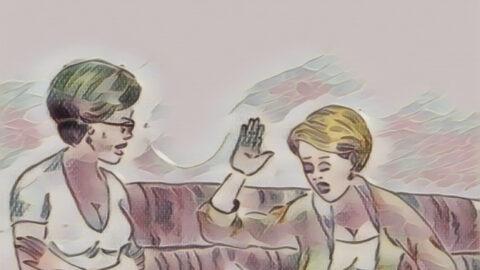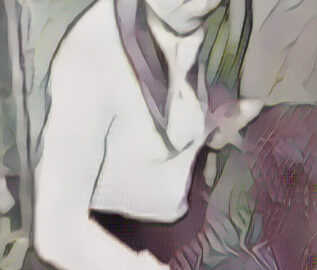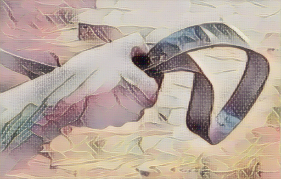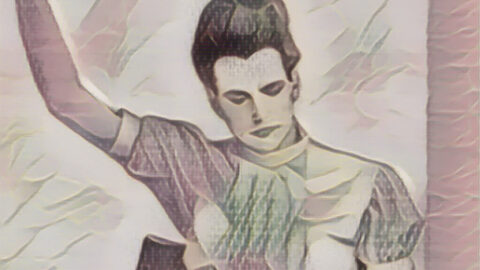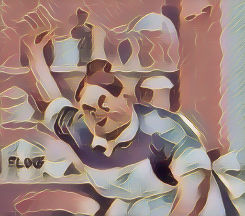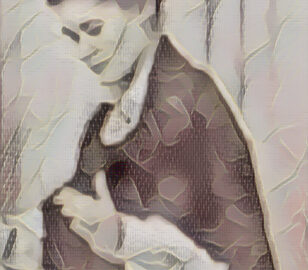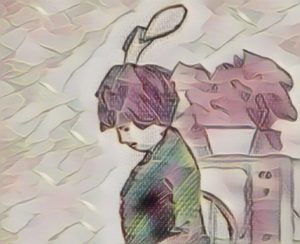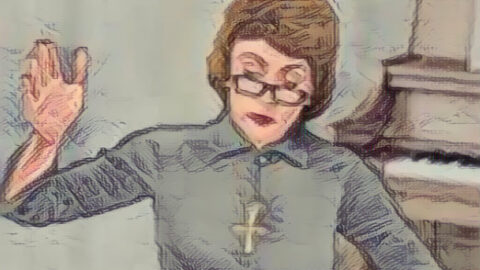(gap: 2s) There are certain days from one’s childhood that remain forever bright in the memory, no matter how many years may pass. Some are filled with laughter and sunshine, while others are remembered for quite different reasons. This is the story of one such day—a day so clear and unforgettable that, even now, I can recall every detail. It was the day of the double punishment, a day that began with innocent curiosity and ended with a lesson I would never forget.
The adventure began at my cousin Linda’s house, a place that always seemed rather magical to me. The sitting room was bathed in warm sunlight, the air scented with lemon polish and the faintest trace of Aunt Carol’s rosewater. Linda was the star of every family gathering—tall and graceful, with honey-blonde hair that curled perfectly at her shoulders, and a smile that could brighten even the dullest afternoon. She had a way of making every day feel like an adventure. I admired her greatly, and wished to spend every moment by her side.
That morning, the house was alive with the sounds of cousins at play, the clatter of dishes from the kitchen, and the gentle murmur of the grown-ups’ conversation. Linda and I had only just begun to plan our next adventure—perhaps something involving the forbidden biscuit tin or a daring expedition in the garden—when, quite suddenly, she vanished. One moment she was there, laughing at my latest joke, and the next, she was gone. It was as if she had disappeared into thin air, leaving behind only the faintest echo of her laughter.
I searched every corner of the house, calling her name, but the adults only gave vague answers. My mother, Barbara, tried to distract me with a plate of apple slices, but I was not to be deterred. “Where is Linda? Why can she not come and play? What has happened?” I must have asked a hundred times, my voice growing more anxious with each repetition. I remember the way my mother’s lips pressed into a thin line, her patience growing ever shorter.
What I did not know was that Linda had found herself in trouble—real trouble. Aunt Carol, who was as petite as she was formidable, had caught her doing something she ought not to have done. Aunt Carol was a lady one did not cross lightly. She had sharp blue eyes that seemed to see everything, a neat bob of chestnut hair, and a presence that filled the room, though she was not very tall. She marched Linda upstairs, her heels clicking on the floor, and the rest of us were left to wonder.
The grown-ups would say nothing more than, “Linda is upstairs, and she shall not be coming down today.” This only made me more determined. I was persistent, following my mother and Aunt Carol from room to room, hoping for a clue. I even tried to bribe my younger cousins with the promise of my best marbles if they would tell me what had happened. But no one would say a word.
At last, my curiosity overcame me. I waited until the adults were busy—Aunt Carol was tending to a pot roast, and Mother was folding laundry—and I crept up the stairs, my heart beating fast. The hallway upstairs was dim and quiet, the sort of quiet that makes one tiptoe, even when there is no need. I was halfway to Linda’s door when I heard a sharp voice behind me.
“Susan!” Aunt Carol’s voice could stop anyone in their tracks, and it certainly stopped me. She stood at the bottom of the stairs, arms folded, her expression a mixture of exasperation and, perhaps, a hint of amusement. I froze, caught in the act, and for a moment, I hoped she might let me off with a warning. But then she exchanged a look with my mother—a look that said everything without a single word.
After a brief, whispered conversation between the two of them, Mother took my hand. I remember the feel of her cool, strong fingers around mine, and for a moment, I thought, “At last! I am going to see Linda!” But instead of leading me to Linda’s room, Mother guided me into Aunt Carol’s bedroom. The door closed behind us with a soft but ominous click.
The room was neat and tidy, sunlight streaming through lace curtains, casting patterns on the bedspread. But my eyes went straight to the chair in the corner—and the hairbrush resting on the bed. It was an ordinary house hairbrush, but at that moment, it looked as fearsome as any weapon. My heart sank.
My mother, Barbara, was a striking woman—tall and sturdy, with a determined set to her jaw and a kindness in her hazel eyes that could become quite stern. She wore her dark hair in a neat bun, and her clothes always smelled faintly of lavender and starch. She sat down on the chair, pulled me gently over her knee, and before I could protest, the hairbrush came down with a sharp smack.
(pause) The first swat landed with a sound that seemed to echo around the room, sharp and startling. I gasped, the sting spreading across my back, hot and immediate. My legs kicked, and I clutched at the bedspread, my face burning with a mixture of pain and embarrassment. I could feel my mother’s arm, strong and unyielding, holding me firmly in place. There was no escape, no room for argument—only the certainty that I was in trouble, and that this was the consequence.
(short pause) The hairbrush came down again, and again, each smack followed by my yelps and promises to behave. Tears filled my eyes, blurring the lace curtains and the neat patterns of sunlight on the floor. I remember the strange mix of emotions—shame, regret, and a helplessness that only a child can feel at such a moment. The world shrank to the sound of the hairbrush, the sting on my skin, and the knowledge that I had crossed a line I could not uncross.
(pause) Through it all, my mother’s face was set, her jaw tight, but her eyes glistened with something softer—perhaps regret, or the pain of having to be the one to discipline. When it was finally over, she set the hairbrush aside, her hand trembling just a little. She took a deep breath, her cheeks flushed with a mixture of frustration and sorrow, and then she reached for me—not with anger, but with a kind of weary tenderness. She helped me up, smoothing my hair, her touch gentle now, as if to say she wished things could have been different.
She took me by the arm—firm, but not unkind—and led me straight to Linda’s room. My legs felt like jelly, and I could barely see through my tears. She opened the door, guided me inside, and I stumbled in, still sniffling, my pride and my back equally sore.
Mother’s voice was as sharp as a ruler: “There you are, Susan. You and Linda are to stay here. If either of you leaves before we say so, you shall both be punished again—together!” With that, she closed the door, leaving us alone in our shared misery.
Linda was sitting on her bed, her cheeks blotchy from crying, her blue eyes wide and watery. But even through the tears, there was a spark of mischief in her gaze—a silent understanding that we were in this together. For a moment, we simply stared at each other, both too sore and embarrassed to speak. I flopped onto the bed beside her, burying my face in the pillow, and let the tears come.
We remained in that room for what seemed like hours, the air heavy with the scent of talcum powder and the muffled sounds of the grown-ups downstairs. At first, we did not say a word. But after a while, Linda nudged me and whispered, “At least we are not alone.” That broke the tension, and soon we were exchanging stories about other times we had found ourselves in trouble—like the time Linda tried to roller skate in the kitchen, or when I accidentally let the neighbour’s cat into the pantry. We even managed a few giggles, though every laugh made us wince.
At last, the door creaked open, and Mother appeared, her expression much softer now. She knelt beside me, smoothing my hair back from my forehead, and told me it was time to go home. I hugged Linda for a moment, both of us promising to be more careful next time, though we both knew it was a promise we might not keep.
But the day was not yet over. As soon as we arrived home, Mother sat me down on the edge of my bed, her face serious. She explained, in her calm, measured voice, why my behaviour had been wrong—how I had made things more difficult for everyone, and how I must learn to listen. And then, with a sigh, she gave me another punishment—this time with her hand.
(pause) The second punishment was different—less dramatic, but somehow more personal. There was no hairbrush, only the firm, rhythmic swats of her palm, and the steady cadence of her voice reminding me why this was happening. I kicked and squirmed, but Mother was determined to make her point. The sting was sharp, but it was the disappointment in her eyes that hurt most of all.
I was still sobbing when she tucked me into bed, cheeks wet and pride wounded. She sat beside me for a moment, her hand gentle on my back, and said, “If you ever behave like that again, Susan, you shall be punished every night for a week!” That was enough to keep me on my best behaviour for a very long time.
Lying there in the dark, I listened to the sounds of the house settling—the creak of the floorboards, the distant clatter of dishes in the kitchen, the soft murmur of my parents’ voices. My back still throbbed, but what hurt most was the feeling that I had let everyone down. Still, as I drifted off to sleep, I thought about Linda, about our whispered stories and shared giggles, and I knew that, somehow, we would both be all right.
Looking back now, I can almost laugh about it. The memory has softened with time, the sting replaced by a gentle nostalgia. But at the time, it was the longest, sorest day of my young life—a true lesson in good behaviour, courtesy of Barbara, with her firm will and gentle heart, and Carol, sharp-eyed and quick to act, and a hairbrush I shall never forget. And, of course, the unbreakable bond between two cousins who always managed to find adventure—and each other—no matter what.

























